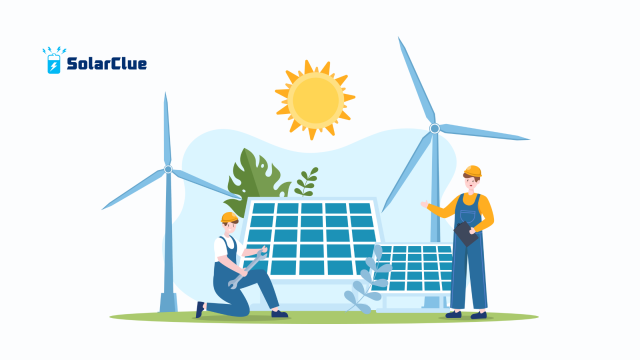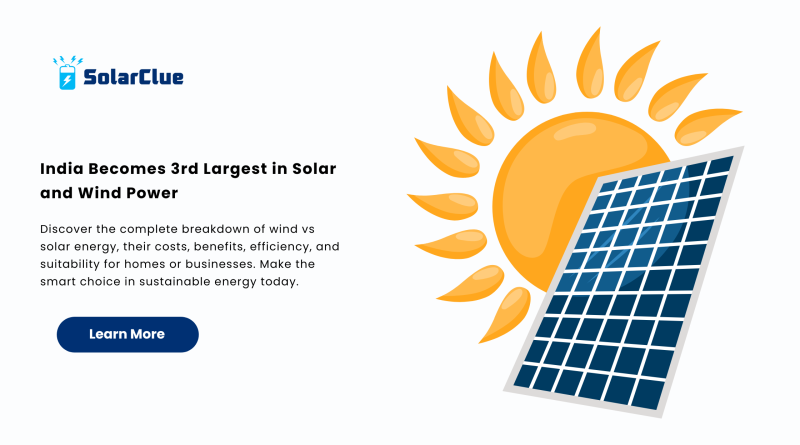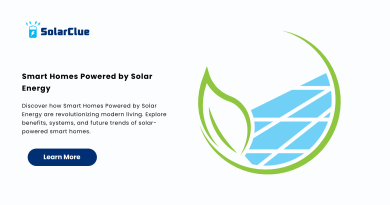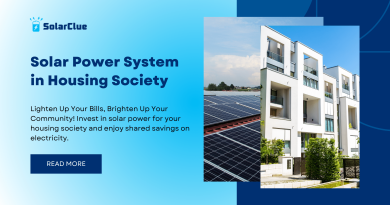Wind vs Solar Energy: Which Renewable Power Source Is Right for You?
As the global push for sustainable energy options gains momentum, the question “Which renewable energy is better, wind or solar?” is becoming more important than ever. With rising electricity bills and increasing environmental awareness, more homeowners and businesses are considering renewable energy for homes and commercial use. But choosing between wind energy and solar energy isn’t always simple. This guide offers a deep dive into the renewable energy comparison, helping you confidently choose the best renewable energy source for your specific needs.
Table of Contents
- 1 Understanding Renewable Energy: A Quick Overview
- 2 How Does Solar Energy Work?
- 3 How Does Wind Energy Work?
- 4 Advantages of Solar Energy
- 5 Advantages of Wind Energy
- 6 Wind or Solar Better for Your Home?
- 7 Best Renewable Energy for Business Use
- 8 Solar and Wind Energy Differences
- 9 Environmental Impact: Solar vs Wind
- 10 Solar vs Wind Power Effectiveness
- 11 Cost of Wind Energy vs Cost of Solar Energy
- 12 Renewable Energy Pros and Cons
- 13 Renewable Energy for Sustainability and the Future
- 14 Renewable Energy Choices: Making the Final Decision
- 15 Conclusion: Wind vs Solar Energy—What’s Best?
- 16 FAQs
Understanding Renewable Energy: A Quick Overview
Renewable energy comes from sources that are naturally replenished—like sunlight and wind. It’s clean, sustainable, and key to reducing carbon emissions. Among the most popular options are solar and wind power, but how do they stack up against each other?
How Does Solar Energy Work?
Solar energy uses photovoltaic cells (PV panels) to capture sunlight and convert it into electricity. A solar power system can be installed on rooftops, open fields, or even vehicles. It’s reliable, silent, and works best in sunny climates. The solar energy efficiency typically ranges from 15% to 22%, depending on the panel technology.
How Does Wind Energy Work?
Wind energy is produced when turbines convert the kinetic energy from wind into electricity. It’s especially effective in areas with consistent wind speeds like coastal regions or open plains. Wind energy efficiency can go as high as 45%, making it one of the most effective efficiency of renewable energy sources—provided location and wind conditions are favorable.
Advantages of Solar Energy
Here’s why solar energy benefits stand out:
-
Low maintenance and long-lasting
-
Can be installed on existing structures
-
Government subsidies and tax credits available
-
Great for urban and suburban homes
-
Solar energy potential is massive in sunny regions
Advantages of Wind Energy
Let’s break down the top advantages of wind energy:
-
Produces more energy in optimal wind zones
-
Takes up less ground space—land can still be used for farming
-
Can generate electricity day and night
-
Wind energy benefits the grid with consistent power when the sun isn’t shining
Wind or Solar Better for Your Home?

When it comes to wind energy vs solar energy for home, the winner often depends on location. Urban dwellers may find solar more practical due to rooftop space and fewer zoning issues. In contrast, rural homeowners with plenty of land and high wind availability may benefit more from wind systems. Additionally, renewable energy for homes should factor in ease of installation, maintenance, and access to repair services.
Best Renewable Energy for Business Use
Commercial properties often consume more electricity and may require scalable solutions. In sunny regions, a large-scale solar power system is easier to manage and maintain. However, in windy areas or where land is available, wind turbines might provide a better ROI. When choosing the best renewable energy for business, consider land, budget, and energy needs. Hybrid systems are also gaining traction for their reliability and reduced dependency on the grid.
Solar and Wind Energy Differences
While both provide clean energy, there are key solar and wind energy differences:
-
Solar is predictable and effective in sunny conditions but lacks output at night.
-
Wind runs 24/7 when wind is available but is unpredictable and location-dependent.
Environmental Impact: Solar vs Wind
Environmental Impact of Solar Energy
The environmental impact of solar energy is relatively low. It reduces greenhouse gas emissions, although the panel production process requires mining and some waste management. Still, over its lifetime, it contributes positively to the planet.
Environmental Impact of Wind Energy
The environmental impact of wind energy includes potential noise, bird and bat mortality, and landscape disruption. Yet, turbines generate zero emissions during operation and require less water than fossil fuels, making them eco-friendly.
Solar vs Wind Power Effectiveness
In terms of solar vs wind power effectiveness, solar performs consistently in sunny locations, while wind can outperform solar in high-wind areas. For many, the choice lies in how to choose between wind and solar based on regional resources and electricity needs. Your decision should also consider long-term goals like energy independence and environmental responsibility.
Cost of Wind Energy vs Cost of Solar Energy
Cost of Solar Energy
The cost of solar energy has dropped significantly in the last decade. With government incentives, the average residential installation can range between $10,000 to $25,000. It also offers long-term savings on electric bills. Learn more at solarclue.com.
Cost of Wind Energy
The cost of wind energy depends heavily on scale. While commercial wind farms are cost-efficient, residential turbines can be expensive and require maintenance. Also, you might face zoning or aesthetic restrictions in certain areas, which can increase costs and delay implementation.
Renewable Energy Pros and Cons
Solar Energy:
-
✅ Easy to install in residential areas
-
✅ Low operating costs
-
❌ Limited output at night or during cloudy days
-
❌ Lower efficiency compared to wind
Wind Energy:
-
✅ Higher energy production (in windy areas)
-
✅ Works 24/7
-
❌ Noisy and requires more maintenance
-
❌ Not ideal for all residential settings
Renewable Energy for Sustainability and the Future
Both wind and solar are essential in the future of renewable energy. They complement each other, especially in hybrid systems, ensuring continuous power supply. Investing in renewable energy for sustainability is not just environmentally wise—it’s financially strategic. The global market is shifting, and those who adapt early will benefit the most.
Renewable Energy Choices: Making the Final Decision
When facing renewable energy choices, consider:
-
Your region’s sunlight and wind availability
-
Local laws and zoning regulations
-
Upfront cost and maintenance capacity
-
Long-term energy savings
Ultimately, the comparison of renewable energies shows there’s no one-size-fits-all answer. But combining solar and wind can offer maximum efficiency, especially for off-grid applications. Want to go deeper into choosing the right system? Check out blog.solarclue.com for expert guides, case studies, and energy-saving tips.
Conclusion: Wind vs Solar Energy—What’s Best?
If you’ve been wondering wind or solar better, the answer lies in your needs and geography. Solar is ideal for urban and sun-rich areas. Wind thrives in rural or coastal environments. Both are vital in the shift toward clean, green energy.
By assessing the efficiency of renewable energy sources, their cost, and long-term potential, you’ll make the right decision for your home or business. Whether it’s cutting emissions, reducing energy bills, or achieving energy independence—wind vs solar energy is the conversation we all need to have today.
For custom solar solutions or to explore the best systems for your needs, visit solarclue.com—where green energy meets smart savings!
FAQs
1. Is wind or solar more efficient?
Wind energy efficiency can exceed solar energy efficiency in optimal locations, but solar is more consistent and practical in many homes.
2. Which is cheaper: wind or solar?
Generally, solar energy is cheaper and more accessible for households, especially with tax credits and decreasing installation costs.
3. Can I use both wind and solar together?
Yes! Hybrid systems combining solar and wind are popular in off-grid and rural setups for more consistent power.
4. What’s better for small businesses?
For most businesses, especially urban ones, solar is easier to install and maintain. Rural businesses might benefit more from wind if conditions are right.
5. Does renewable energy help with climate change?
Absolutely. Both wind and solar energy drastically reduce emissions and play a major role in combating global warming.
Curious to learn more about your energy options? Visit us now at solarclue.com and unlock the future of clean energy in a way that’s right for you!




